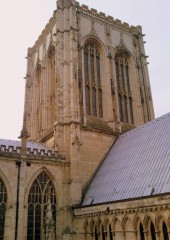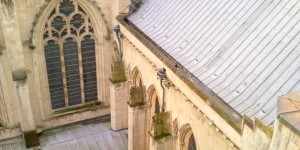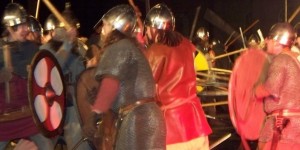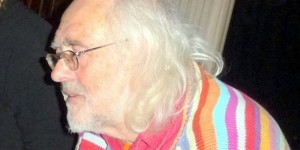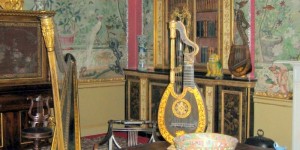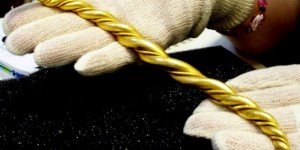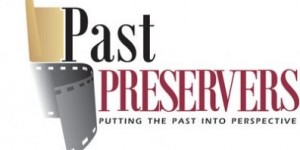- What is your job title?
Community Archaeologist - What are you current projects, museum or personal?
I am a project in my own right really. I run the Greater York Community Archaeology Project, a Heritage Lottery funded position which grew up from a few community projects in the York area wanting to get involved with the Archaeology in their back gardens who felt that although there were a lot of archaeologists in York, there was no one particular stop to go talk to someone and get advice and information. They felt a little intimidated if you like about the professional/amateur boundary which made a few people worried about the process of doing archaeology. The idea of the project in that respect is to try to build their confidence, show them the sorts of things they can do. Sometimes that means I just go along to hold their hands and other groups have actually raised the money themselves and brought in people. One of the groups at Dunnington, just outside of York, raised enough money to bring in a local unit to bring in a professional to act as a director and they did the rest of the work. A couple of groups have done that, but I can provide a contact for it. - Has that been successful in terms of the archaeology that has come out of it?
Its been successful at times in a localised way, work has gone ahead and been done. It doesn't move very quickly, it takes a long time for people to get interested in something and then for a local group to get as far as doing geophysics say. A group at Stockton-on-Forest want to expand their understanding of an area to the south of the village where a water pipe was put in and an excavation done in advance where everything was looked at, producing one part in particular of interest, but just along the area where the pipe was to be. The group want to use geophysics to expand their understanding of the rest of the fields that wasn't covered. However, this work can only be done when the crops aren't around so there's a scurry of activity for a few days in the Autumn but then its back under crops. Its frustrating in terms of research but people are doing lots of things that are interesting and exciting. They do things that they are interested in. - What first got you interested in Archaeology?
I came into arch later in life, late 20's, when I became more disillusioned with what I was doing, working in social housing as a housing officer. This was a period when a large amount of housing stock was being sold off, and I was giving advice to the people needing the stock left. I wanted to go do something I was inspired by and I was always interested in the past and I was tempted in by television. - How did you get into the Archaeology careers field and your current job?
I went and talked to people. The first was the archaeologist based in Poole, then the department at Southampton. It became apparent I'd need a degree and I needed to earn enough to pay my way through the degree. I arrived at York in the mid 90's to do my undergraduate degree. I then did the Masters in Archaeological Heritage Management which led me to do a PhD at Lancaster. During that time I tried to get out to do field archaeology as much as I could and acted like an itinerant fieldworker going from one project to the next over summer, getting as much experience as I could then going back and starting a new term. I also volunteered with YAT on different projects. Then I started to get the odd paid supervisor job. Once I finished my PhD and was writing up, I was volunteering then getting paid to work as a finds assistant at YAT. I then looked for more consistent work and worked with the ADS [Archaeology Data Service] at the University of York on a European project for three years. I did bits and bobs doing short contract work and ADS paid for me to set up a few projects with English Heritage and then I did maternity cover for Judith Winters at Internet Archaeology. I had quite a lot of non-fieldwork experience and did the first part of the Parks and Gardens Project at the University and only then I saw this position as Community Archaeologist which I wanted to do and go back to combine the enthusiasm I had for fieldwork with working with communities, taking it back to my previous jobs working with communities and housing estates. It was an ideal combination of my interests. - What kinds of experiences have got you where you are today?
It's involved quite a lot of following academic pursuits and involved quite a lot of working for not very much money or no money at all. But you do have to stick at it, volunteering for a couple of weeks doesn't guarantee anything really it does make sure you know the right people but it doesn't always take you to the places you want to be. It is useful to find your way in this rather unusual career. - What are some of the best parts of your job?
It's a combination of working with people in the here and now, rather than just working with the past and doing fieldwork and getting outside. I always wanted to be an outdoor person, it's a combination of that and working with the public. - And some of the worst?
I suppose one of the worst has been, over the years not just this job, has been that general insecurity. I don't think I've been on a job for life type position, a contract that will just terminate when your 65, since my mid 20's. But on the other hand it provides opportunities, it keeps you on your toes and every now and again you have these moments which take you in a completely different direction. So even the grotty bits you can turn to your own advantage. I find it frustrating that you cant always go in the direction you want to go in and sometimes you have to go in the direction the groups want to go in rather than the research potential and I can only say 'wow, this is really interesting' but if they want to go another way, I have to go that way. - What are your thoughts on the state of the archaeology field in this country? Do you think it's adequate, is there any room for improvement and if so where?
There's lots of room for improvement, there always is. I think research has been sidelined in a lot of areas apart from academia or you can find the money to do a PhD. There isn't a lot of fieldwork being done with a research agenda at the fore and that is a part of archaeology's place in the planning process. In some respects, that solves a lot of the rescue problems, the polluter pays principal has solved a lot of the issues but it has also put a lot of archaeology into a box which is frustrating. I anticipated a lot of the problems would be solved with the Heritage bill, but that has since collapsed. I can only see things staying as they are for the time being. Archaeology right now is under a great deal of threat at the moment. Research archaeology has been suppressed for a long time but the balance of archaeology is under threat in this recession period. I don't know which way this could go. People are talking of taking away in the planning process the Section 106 agreement which gives the council the opportunity to include some monies for public archaeology and also community projects. The developers want to drop them whilst the recession is on; they don't want to build say a community centre whilst they're building a housing development. These are little things that might be a drip effect and cause problems for archaeology in later years. It might be we come out of the recession a little weaker or we might come out looking good doing more research and education. - How do you see the current Archaeological climate in terms of jobs in this country?
It's not looking all that good at the moment. One thing that might happen again, a reinvention of the Manpower Services Scheme from the 80's, as archaeology has the potential to provide people with new skills that might help them re-employ themselves. This might not do much for the already trained archaeologists, and might mean more people as we come out of recession looking for the jobs. Although most archaeologists now are graduates and they will probably be favoured, but there might be the odd star excavator. That's just a thought though, it might not happen. It might further research archaeology as there will be less developments going on. - What advice do you have for students wishing to get a job in Archaeology?
I've covered that a bit already, but try to find volunteering opportunities and try to cover as much stuff as you can; a long term C.V. building plan. Stick with it and in some ways it's a case of outlasting the competition although new people appear every year. Accumulate experience. - What are your experiences of job interviews?
Well I've done quite a few being a bit older so I'm no longer particularly phased by them. I take the outlook of letting my enthusiasm come through. I've had to do presentations in a few of the more recent ones and the Assessed Seminars and Lectures are particularly good as it comes up time and time again, you do it all the time; conference papers, talks to community groups and getting trained to do it at university is a great help, although you might hate doing them! - Do you have any interview technique tips?
First of all, stick with what you know. You need to know what you think the interviewer wants to know, but be honest with yourself. The more you pretend to be into things you're not into, the more it will cause problems, even if you get the job. Find the areas you know you are strong in and when your on those you are your doing best, being enthusiastic and relaxed and friendly.
With thanks to Jon Kenny


